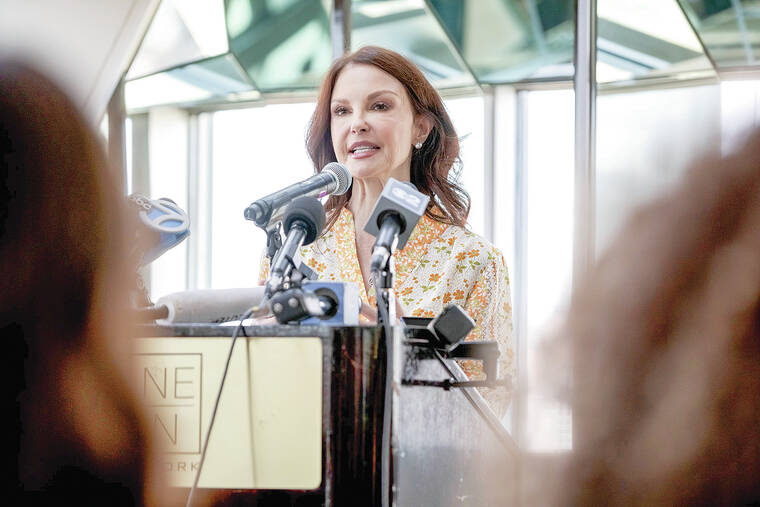Harvey Weinstein’s conviction is overturned by New York’s top court
NEW YORK — New York’s highest court on Thursday overturned the felony sex crimes conviction of notorious Hollywood producer Harvey Weinstein, a staggering reversal of a bedrock case in the #MeToo era that prompted countless victims of sexual harassment and assault to come forward as accusers.
In a bitterly contested 4-3 decision, the New York Court of Appeals found that the trial judge who had presided over Weinstein’s case deprived him of a fair trial in 2020 by allowing prosecutors to call witnesses who said Weinstein had assaulted them — but whose accusations were not the basis for any of the charges against him.
ADVERTISING
Responding Thursday, the Manhattan district attorney, Alvin Bragg, announced that he would seek to prosecute Weinstein again.
“We will do everything in our power to retry this case, and remain steadfast in our commitment to survivors of sexual assault,” a spokesperson for Bragg’s office said.
The decision to overturn the conviction, while shocking to many, had been anticipated in legal circles. The criminal case against Weinstein had been viewed as fragile since the day it was filed, and prosecutors were believed to have taken risky, boundary-pushing bets to see it through. Still, the ruling was met with expressions of shock and anger by some of Weinstein’s accusers.
Ashley Judd, the first actor to come forward with allegations against Weinstein, called it “unfair to survivors.”
“We still live in our truth,” Judd said Thursday. “And we know what happened.”
For all its legal implications in New York, the decision’s immediate impact on Weinstein, 72, who is being held in an upstate prison in Rome, New York, might amount to little more than a change of scenery. Weinstein, who was also convicted of rape and sexual assault in a separate case brought by prosecutors in Los Angeles, could be transferred to California to begin a 16-year prison sentence there.
But for now, he will be taken to a facility closer to New York City in preparation for a new trial, said his lawyer, Arthur Aidala.
Weinstein had been a sharp-elbowed titan in the film industry, rising to power in the 1990s behind a stream of critically lauded, blockbuster movies under the Miramax label. His downfall after lurid accusations emerged from dozens of actresses and former colleagues became a primer for how the world viewed and treated many once-powerful men who used their positions for sex.
Weinstein was accused of sexual misconduct by more than 100 women; in New York he was convicted of assaulting two of them. Thursday’s decision did not discount the credibility of the accusations against him. Rather, it found fault with the admission of the testimony of women whose descriptions of abuse fell outside the criminal case.
“It is an abuse of judicial discretion to permit untested allegations of nothing more than bad behavior that destroys a defendant’s character,” Judge Jenny Rivera wrote on behalf of the majority, “but sheds no light on their credibility as related to the criminal charges.”
Donna Rotunno, Weinstein’s lead trial lawyer in New York, praised the ruling Thursday.
“They were prosecuting him for sins, not crimes,” she said. “This speaks to our justice system as a whole. The court ruling says to prosecutors: Winning at all costs is not your job. Your job is to put on a fair trial.”
Legal experts said that risky decisions by prosecutors in the New York case created two major issues that led the appeals court to overturn the conviction. One involved testimony from four women who told the jury about encounters with Weinstein that were unrelated to the crimes with which he was charged. The other stemmed from the trial judge’s decision to permit prosecutors to question the producer about uncharged allegations — spanning back decades — if he decided to testify.
That decision, Weinstein’s lawyers wrote in their appeal, kept their client from testifying in his own defense and, in combination with the testimony from the four women, “destroyed even the semblance of a fair trial.”
The heart of the appeal centers on so-called Molineux witnesses, who are allowed to testify about criminal acts that the defendant has not been charged with.
In Weinstein’s New York case, prosecutors called other women to the stand, including Dawn Dunning, Tarale Wulff and Lauren Young, who were allowed to testify that Weinstein had assaulted them even though he was not charged with the assaults.
The prosecution’s reliance on such witnesses risked violating a cardinal rule of criminal trials, the legal experts said: Defendants must be judged only on the acts they are being charged with.
The testimony rendered the trial fundamentally unfair, Weinstein’s lawyers had argued, adding that prosecutors had also brought in character witnesses who portrayed Weinstein as a cruel and capricious figure.
It remains to be seen whether the California case, which also relied on witnesses who said that Weinstein assaulted them but whose accusations were not the basis for criminal charges, can survive a similar challenge. His lawyer in that case, Jennifer Bonjean, said she planned to file an appeal next month.


